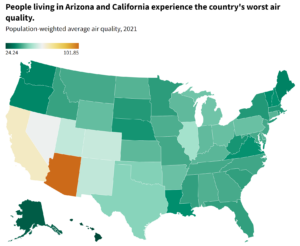The smoke emanating from the raging wildfires in Canada enveloped a large portion of the eastern U.S. this week, casting an unsettling haze that degraded air quality, affecting millions.
Cityscapes took on an eerie orange hue and local authorities urged residents to remain indoors for safety. For those closely impacted, the National Weather Service anticipates little to no improvement in the “hazardous” and “very unhealthy” conditions for the immediate future.
Some of those impacts are registering across the Southeast, according to AirNow.gov, an official website indexing air quality throughout the United States.
For Alabama, the NWS advises, “We’ll start seeing some hazy conditions today as northerly flow from Canada at 10-15,000 feet will begin to set in across the Southeast.”
The weather service issued a poor air quality alert today for Madison and Morgan counties. It advised that people with pulmonary or respiratory ailments or diseases should limit their outdoor activity.
The Air Quality Index (AQI) is a standardized tool used to measure daily air quality. The U.S. Environmental Protection Agency (EPA) calculates AQI using data on several major factors. As of the latest data available in 2023, Alabama’s AQI falls in the “Moderate” range – comparable to Georgia and Tennessee.
But Alabama fares better than states with historically poor air quality like California. Southern states, in general, tend to have moderate AQIs.
According to aggregated data from USAFacts.org, “Hawaii has the best air quality in the US with 99.40% of good air quality days. Maine is the second state with the best air quality with 93.20% good air quality days. Alaska comes in third place with 92.30% of good air quality days.”

Alabama is also home to lots of greenery. Our forests act as natural air filters, absorbing carbon dioxide, while releasing oxygen. The green cover not only contributes to a healthier ecosystem but also plays an essential role in maintaining good air quality. On the Gulf Coast, ocean breezes help disperse pollutants, and the rural nature of the state means less congestion and emissions compared to more densely populated urban centers.
As major events like wildfires continue to plague states like California and New York, Alabama is expected to maintain moderate air quality. Stay connected with the National Weather Service and local alerts to monitor changing conditions.
Grayson Everett is a staff writer for Yellowhammer News. You can follow him on Twitter @Grayson270
Don’t miss out! Subscribe today to have Alabama’s leading headlines delivered to your inbox.
